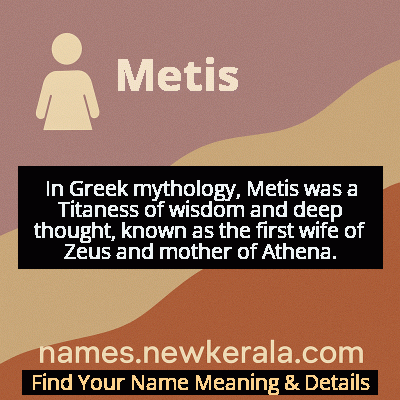Metis Name Meaning & Details
Origin, Popularity, Numerology Analysis & Name Meaning of Metis
Discover the origin, meaning, and cultural significance of the name METIS. Delve into its historical roots and explore the lasting impact it has had on communities and traditions.
Name
Metis
Gender
Female
Origin
Greek
Lucky Number
3
Meaning of the Name - Metis
In Greek mythology, Metis was a Titaness of wisdom and deep thought, known as the first wife of Zeus and mother of Athena.
Metis - Complete Numerology Analysis
Your Numerology Number
Based on Pythagorean Numerology System
Ruling Planet
Jupiter
Positive Nature
Optimistic, inspirational, and creative.
Negative Traits
Scattered, exaggerating.
Lucky Colours
Yellow, gold, purple.
Lucky Days
Thursday.
Lucky Stones
Yellow sapphire.
Harmony Numbers
1, 2, 9.
Best Suited Professions
Arts, writing, communication.
What People Like About You
Creativity, optimism.
Famous People Named Metis
Metis (Greek Mythology)
Titan Goddess
First wife of Zeus and mother of Athena, embodiment of wisdom and cunning
Metis (Astronomy)
Jupiter's Moon
Innermost moon of Jupiter discovered in 1979, named after the mythological figure
Metis (Canadian Culture)
Cultural Identity
Represents the Métis people of Canada, a distinct indigenous culture with mixed heritage
Metis (Technology)
Educational Platform
Leading online education company specializing in data science and analytics training
Name Variations & International Equivalents
Click on blue names to explore their detailed meanings. Gray names with will be available soon.
Cultural & Historical Significance
Extended Personality Analysis
Individuals bearing the name Metis are typically characterized by exceptional intellectual capabilities and strategic thinking. They possess a natural inclination toward problem-solving and often demonstrate remarkable foresight in their decision-making processes. The mythological association with cunning intelligence manifests in practical wisdom - the ability to navigate complex situations with grace and effectiveness. Metis personalities tend to be highly perceptive, with an almost intuitive understanding of systems, patterns, and human behavior. They are often the 'brains behind the operation,' preferring to work behind the scenes rather than seeking the spotlight. Their wisdom is not merely theoretical but deeply practical, making them excellent advisors, planners, and strategists. However, this contemplative nature can sometimes make them appear reserved or detached. They value knowledge and learning above most other pursuits and often become lifelong students of their chosen fields. The combination of intellectual depth and practical application makes Metis-named individuals particularly effective in leadership roles that require long-term vision and strategic planning.
Modern Usage & Popularity
In contemporary naming practices, Metis remains an uncommon but meaningful choice that has maintained a consistent, though limited, presence. The name appeals particularly to parents with interests in classical mythology, philosophy, or those seeking a name that embodies intelligence and wisdom. While it doesn't appear on mainstream baby name charts in most English-speaking countries, it has seen occasional use in academic and intellectual circles. The name's rarity adds to its appeal for parents seeking unique but historically significant names. In Canada, the spelling 'Métis' carries additional cultural significance and is sometimes used to honor indigenous heritage. The name has also gained some traction in the technology and education sectors, where its association with wisdom and strategy resonates with professionals in these fields. Recent years have seen a slight increase in mythological name usage, potentially benefiting names like Metis. However, its challenging pronunciation for some and strong mythological associations mean it's likely to remain a niche choice rather than becoming mainstream.
Symbolic & Spiritual Meanings
The name Metis carries rich symbolic meanings that extend far beyond its literal translation of 'wisdom.' It represents the concept of metis in Greek philosophy - a form of intelligence that combines cunning, practical skill, adaptability, and strategic thinking. Symbolically, Metis embodies the power of intellect to overcome physical limitations and the importance of mental agility in navigating life's challenges. The mythological narrative of Metis being internalized by Zeus symbolizes how true wisdom becomes an integral part of one's being rather than an external attribute. The subsequent birth of Athena from Zeus's forehead represents how great ideas and strategies emerge from deep contemplation. Metis also symbolizes maternal wisdom and the transmission of knowledge across generations. In broader symbolic terms, the name represents the eternal value of intelligence in human affairs, the triumph of mind over brute force, and the creative power of strategic thinking. It serves as a reminder that the most powerful weapons are often those of the intellect rather than physical strength.

